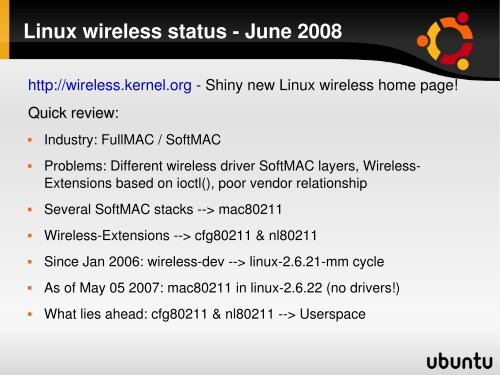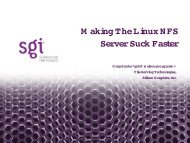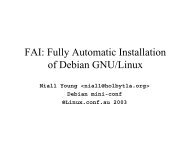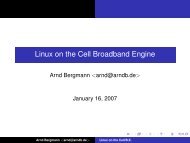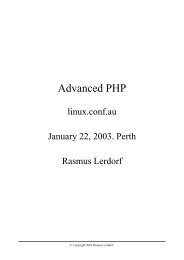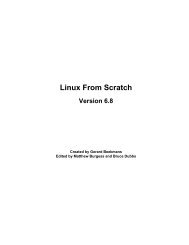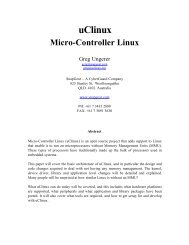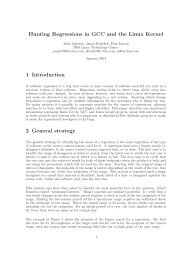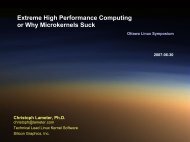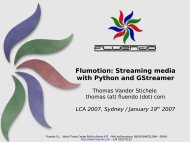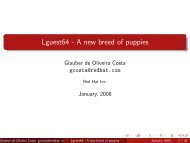Linux wireless status June 2008 - dei.uc.
Linux wireless status June 2008 - dei.uc.
Linux wireless status June 2008 - dei.uc.
Create successful ePaper yourself
Turn your PDF publications into a flip-book with our unique Google optimized e-Paper software.
<strong>Linux</strong> <strong>wireless</strong> <strong>status</strong> <strong>June</strong> <strong>2008</strong><br />
http://<strong>wireless</strong>.kernel.org Shiny new <strong>Linux</strong> <strong>wireless</strong> home page!<br />
Quick review: review<br />
Industry: FullMAC / SoftMAC<br />
Problems: Different <strong>wireless</strong> driver SoftMAC layers, Wireless<br />
Extensions based on ioctl(), poor vendor relationship<br />
Several SoftMAC stacks > mac80211<br />
WirelessExtensions > cfg80211 & nl80211<br />
Since Jan 2006: <strong>wireless</strong>dev > linux2.6.21mm cycle<br />
As of May 05 2007: mac80211 in linux2.6.22 (no drivers!)<br />
What lies ahead: cfg80211 & nl80211 > Userspace
FullMAC Vs SofMAC<br />
Where does the MLME go, hardware or software?<br />
What is the MLME? Does your driver get raw 802.11 frames or raw 802.3 frames?<br />
MLME stands for Media Access Control (MAC) Sublayer Management Entity. MLME is the management entity<br />
where the Physical Layer (PHY) MAC state machine resides. Examples of states an MLME may assist in<br />
reaching:<br />
Authenticate<br />
Deauthenticate<br />
Associate<br />
Disassociate<br />
Reassociate<br />
Beacon<br />
Probe<br />
FullMAC chipset examples: ISL389x (prism54), Marvell Libertas 8388 (Sony PSP, OLPC, Apple iPhone?)<br />
SoftMAC chipset examples: zd1211, bcm43xx, Atheros ar5k family chipsets, Intel iwlwifi, Ralink rt2x00
Different SoftMAC layer mess<br />
Ahh! $@!!$!!%%<br />
ieee80211.sf.net: ieee80211.sf.net Intel for ipw2100, ipw2200, then ieee80211softmac was added – originally<br />
SoftMAC layer for bcm43xx<br />
net80211: net80211 NetBSD SoftMAC layer used by MadWifi, old islsm (replaced by p54)<br />
mac80211: mac80211 Shiny new <strong>Linux</strong> SoftMAC layer, originated as code contributed by Devicescape,<br />
originally called d80211, renamed to mac80211. Tested in linux2.6.21mm series, merged now<br />
for linux2.6.22.<br />
ieee80211softmac drivers: bcm43xx, zd1211rw
Problems with <strong>Linux</strong> <strong>wireless</strong><br />
WirelessExtensions built on ioctl()<br />
From <strong>Linux</strong> Device Drivers 3 rd Edition:<br />
”In user space, the ioctl system call has the following prototype:<br />
int ioctl(int fd, unsigned long cmd, ...);<br />
The prototype stands out in the list of Unix system calls because of the dots, which usually mark the<br />
function as having a variable number of arguments. In a real system, however, a system call can’t<br />
actually have a variable number of arguments. System calls must have a welldefined prototype,<br />
because user programs can access them only through hardware “gates.” Therefore, the dots in the<br />
prototype represent not a variable number of arguments but a single optional argument, traditionally<br />
identified as char *argp. The dots are simply there to prevent type checking during compilation.” ...<br />
”The unstr<strong>uc</strong>tured nature of the ioctl call has caused it to fall out of favor among kernel developers. Each<br />
ioctl command is, essentially, a separate, usually undocumented system call, and there is no way to<br />
audit these calls in any sort of comprehensive manner. It is also difficult to make the unstr<strong>uc</strong>tured ioctl<br />
arguments work identically on all systems; for example, consider 64bit systems with a userspace<br />
process running in 32bit mode.”<br />
Future development: cfg80211, nl80211, iw, wpa_supplicant, hostapd, Network Manager
Fix it all!<br />
zd1211rw: port to mac80211 complete and merged on 2.6.25<br />
Ieee80211softmac and bcm43xx driver removed on 2.6.26<br />
Only 1 SoftMAC stack: mac80211<br />
802.11n (HT) support added onto mac8021 by Intel on 2.6.25<br />
Iwl4965 first and only 802.11n driver<br />
New rate control algorithm on 2.6.25: PID controller<br />
Regulatory: CRDA
CRDA<br />
Central Regulatory Domain Agent<br />
Some mac80211 drivers have its own set of regulatory restrictions. All this code has been removed with a basic<br />
set of restrictions remaining in mac80211 (FCC and Japan channels).<br />
Centralize regulatory restrictions instead<br />
Move database out of the kernel (updates through userspace)<br />
Have a simple regulator.txt ASCII file, parsed and stored into regulatory.bin<br />
Sign the database using RSA private key, embed RSA public key<br />
Have a CRDA daemon or CRDA userspace helper, reads regulatory.bin<br />
Kernel queries CRDA daemon/userspace helper and gets back one regulatory domain<br />
regulatory.txt entry for CR:<br />
country CR:<br />
(5170 5250 @ 20), (6, 17), EDGEPOWER1, NOHT40<br />
(5250 5330 @ 20), (6, 23), EDGEPOWER1, NOHT40<br />
(5735 5835 @ 20), (6, 30), EDGEPOWER1, NOHT40<br />
(2402 2482 @ 20), (N/A, 20), EDGEPOWER2<br />
(2402 2482 @ 20), (N/A, 20), EDGEPOWER2
CRDA
mac80211 drivers<br />
mac8021 drivers: drivers adm8211, b43, b43legacy, p54, rt2x00, rtl818x, zd1211rwmac80211, ath5k<br />
The Kinks: mac80211 driver requires v4 firmware. bcm4301 and bcm4303 chipsets (both 802.11b<br />
only) require firmware v3. The driver changes considerably based on firmware. Port of<br />
bcm430[13] 802.11b completed b43legacy. ISL38xx FullMAC and SoftMAC chipsets, vendors<br />
left PCI IDs the same. p54 supports both ISL38xx FullMAC and ISL38xx SoftMAC devices.<br />
Some people claim backward compatibility is broken using SoftMAC driver on FullMAC device,<br />
some others report flawless use of p54.<br />
802.11n:<br />
Vendor support:<br />
Intel, Ralink, (Atheros is coming)<br />
Reverse engineering:<br />
Atheros (HAL), Airgo (TX/RX), Broadcom (driver and firmware), Marvell (eh?), Realtek (?)
Broadcom drivers<br />
Cleanroom reverse engineered. Consists of devices that use two types of firmware: v3 (cores 4 and lower)<br />
and v4 (cores 5 and higher). Requires two different drivers, hence two broadcom mac80211 drivers:<br />
b43legacy – v3 firmware b43 – v4 firmware<br />
SSB: Sonics Silicone Backplane – allows one driver for different buses<br />
Instr<strong>uc</strong>tion set for firmware reverse engineered!<br />
Different formats for cores 4 and lower and cores 5 and higher.<br />
Strange proprietary instr<strong>uc</strong>tion set figured out:<br />
http://bcmv4.sipsolutions.net/802.11/OldMicrocode cores = 5<br />
Assembler/disassembler:<br />
http://bu3sch.de/gitweb?p=b43tools.git;a=summary<br />
New planned firmware (no license yet, broadcom looking closely):<br />
http://bu3sch.de/gitweb?p=b43<strong>uc</strong>ode.git;a=summary
The ath5k wars are over...<br />
Sam Leffler – responsible for 4.2 BSD while at UCB. Worked on free software projects at L<strong>uc</strong>asfilm, Pixar,<br />
SGI, vmware. Committer to FreeBSD and NetBSD.<br />
Original motiviation: p2p link between Berkely and San Fransisco and ”mesh” networks. Project started in<br />
2001.<br />
net80211: started by Atsushi Onoe (~2001) Now at Sony as of 2001?<br />
MadWifi: Sam Leffler ported net80211 to <strong>Linux</strong>, dual licensed the code. Main components:<br />
ath/ net80211/ hal/<br />
OpenBSD: ar5k by Reyk Floeter<br />
ar5k: started as a GPL program to change regulatory domain on the eeprom using MadWifi. Later Reyk used<br />
that as codebase for an entire HAL replacement. Madwifi ath/ + ar5k = OpenBSD's driver.<br />
OpenHAL: port of ar5k to <strong>Linux</strong> by Nick Kossifidis. Previous to this there was an ”athdriver” project. Move<br />
OpenHAL effort to MadWifi.<br />
New goal: kernel inclusion! SFLC gets involved. Then, remove the HAL, and then port the driver to<br />
mac80211.<br />
ath5k: Yay.. license? And then some flamewars... SLFC involved again.<br />
SFLC's role: OpenBSD code OK, OpenHAL code OK, ath5k license OK
What are distributions picking up?<br />
Ubuntu:<br />
Gusty st<strong>uc</strong>k on 2.6.22<br />
Hardy targetting 2.6.24<br />
Intrepid: based on 2.6.26<br />
Fedora:<br />
Fedora 8 on 2.6.23, had ath5k already, gets a lot of updates<br />
Fedora 9 on 2.6.25<br />
Intel provided their own mac80211 releases for their own drivers – not anymore<br />
Better work on a central effort:<br />
http://<strong>wireless</strong>.kernel.org/en/users/Download<br />
<strong>Linux</strong><strong>wireless</strong> Compatibility package: For kernels >= 2.6.22. HT support now requires<br />
multiqueue support. Intel recommends it, John uses for Fedora, packaged for Gentoo, ARCH,<br />
and Ubuntu. Packages using nl80211 need to be kept freshly updated as well.
Free driver development!<br />
Project to start writing drivers for free! Old news? Yes, but better<br />
communication efforts.<br />
http://linuxdriverproject.org<br />
Greg KroahHartman – Hired by Novell to do work fulltime on this project.<br />
Project Manager<br />
Developers<br />
We need to establish hard links between companies and Project Managers


